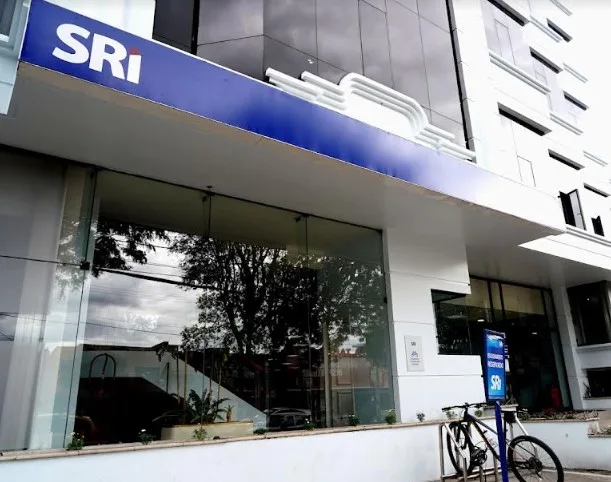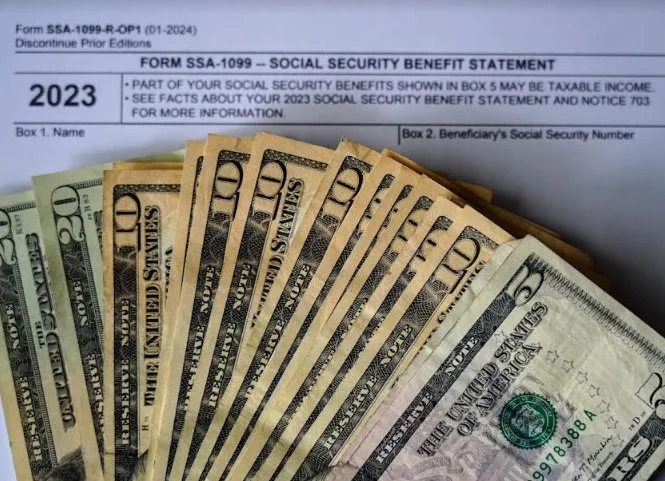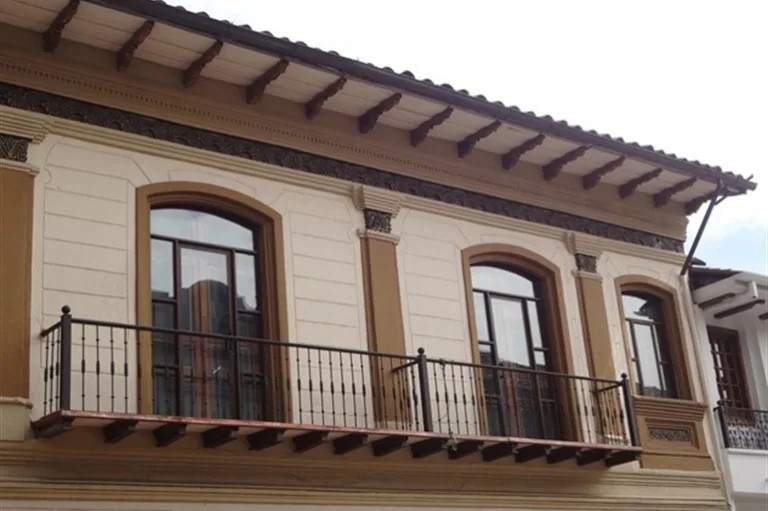Tying up the loose ends on taxation questions
By Stephen Vargha
Many foreigners who reside in Ecuador have expressed at some time their frustrations about the lack of communication and consensus from governmental agencies.
This has led to a third “C”: Confusion.

The SRI – Zonal 6 office is located on Remigio Crespo Toral at Miguel Diaz.
A March 11 CuencaHighLife article about the Ecuadorian income tax created what could be described as a firestorm. On social media, hundreds of expats expressed their thoughts and beliefs.
Two more articles about the Ecuadorian income tax were posted by CuencaHighLife soon afterwards. For numerous expats, it added to the confusion.
Indian American author Deepak Chopra said, “In the midst of chaos, find clarity.”
His quote urged individuals to seek clarity and understanding even in the midst of uncertainty. It encourages individuals to be calm and focused, with clarity and good judgment.
Many expats did but finding the authoritative source to make an informed decision had been elusive.
“Individuals, undivided estates and companies, national or foreign, domiciled or not in the country, that obtain income taxed in accordance with the provisions of the Internal Tax Regime Law are taxpayers of income tax,” said Mauricio Segundo Coronado Chávez.
Coronado is the National Director of Collection and Citizen Assistance. He is the head of Servicio de Rentas Internas (SRI), the Ecuadorian version of the U.S. Internal Revenue Service. His boss is President Daniel Noboa.

Mauricio Segundo Coronado Chávez, the head of SRI, says anyone with income is a taxpayer.
The Internal Tax Regime Law contains a chapter concerning income tax.
“Consequently, all other taxpayers must submit their income tax returns even if they only receive exempt income greater than the fraction taxed at zero rate, according to Article 36 of the Internal Tax Regime Law,” said Coronado.
“”Article 4.1 says residents of Ecuador will be considered tax residents of Ecuador, in reference to a tax year, when your stay in the country, including sporadic absences, for 183 calendar days or more, consecutive, or not, in the same fiscal period,” said Dr. Armando Lana Torres. “The Law states to consider a taxable person as a tax resident are varied, however, it can be seen that, as a standardized measure, the law considers (for different specific cases) the permanence in the country for 183 consecutive days or not, within the same fiscal year or continuous years.”
Dr. Lana was the former director of SRI for Zone 6 in 2017 and 2018. When he was in charge of SRI for Azuay, Cañar, and Morona Santiago provinces, Dr. Lana was aggressive in pursuing taxpayers with outstanding obligations. The Ecuadorian media had several stories in 2017 about the vehicles seized by the Cuenca SRI office for non-payment of taxes.
The March 11 CuencaHighLife article incorrectly stated the law concerning income tax is new. Dr. Lana said the income tax has been levied for several years, but the current regulations come from the Internal Tax Regime Law, with its almost annual reforms being in force since 1989.
“And I insist on pointing out that the income tax has constantly been reformed, mainly since 2007, practically every year,” said Dr. Lana.

Dr. Armando Lana Torres was the former director of SRI for this region. Lana says says residents of Ecuador will be considered tax residents of Ecuador.
Probably the biggest confusion from the expat community is what is considered income for the Ecuadorian tax returns.
“I believe that the lack of knowledge comes because originally our country only had the criterion of recording the income generated in Ecuador, but later incorporated the residence criterion with which both income from Ecuadorian sources and income obtained abroad are taxed,” said Dr. Lana. “And in practical cases, the SRI carries out very limited specific controls, so knowledge of the subject is not common.”
“Income is considered income obtained abroad by natural persons domiciled in the country or by national companies, in accordance with the provisions of Article 98 of the Internal Tax Regime Law,” said Coronado.
“Article 2 specifically states the following are considered to be income: 1. Income from Ecuadorian sources obtained free of charge or for consideration from labor, capital, or both, consisting of money, specie, or services; and 2.- Income obtained abroad by natural persons domiciled in the country or by national companies,” said Jacquie Guerrero. “From the transcribed regulations, it can be seen that our legislation taxes income both from Ecuadorian sources and from abroad.”
Guerrero has been a certified public accountant (CPA) and owner of G&G Asesores en Tributación y Contabilidad for 12 years. She has a master’s degree in taxation from Catholic University of Cuenca as well as “two high-level lawyers” giving her tax law advice.
“It should be noted that, on income obtained abroad, which would be subject to taxation in Ecuador, cases of double taxation may be generated,” said Guerrero. “Ecuador has signed double taxation treaties with 18 countries, so citizens of those countries do not have to declare their income in those countries.”
“There are cases in which Ecuador has agreements to avoid double taxation with several countries, and it is necessary to see in each particular case what type of income it is and how to apply the agreement,” said Dr. Lana. “For now, I inform you that the USA has not signed an agreement with Ecuador.”
While the United States is not one of those 18 countries, Canada has a tax treaty with Ecuador. Canadians are excluded from double taxation of income from Canada.
 The main purposes of tax treaties are to avoid double taxation and to prevent tax evasion. It usually defines when income of individuals resident in one country will be taxed in the other country. This includes salary, self-employment, and government and private pensions.
The main purposes of tax treaties are to avoid double taxation and to prevent tax evasion. It usually defines when income of individuals resident in one country will be taxed in the other country. This includes salary, self-employment, and government and private pensions.
“Pension incomes are exempt, but only from Ecuadorian sources, including institutions such as IESS,” said Jessica Figueroa.
Figueroa, a CPA, got her Bachelor of Science degree in accounting from the University of Azuay. She has had her own accounting business, Accro Corp., for over a decade.
“Among the incomes that the Internal Tax Regime Law establishes as exempt are retirement pensions. But it clarifies that they have to come from the IESS and from employer pensions,” said Guerrero. “According to the Labor Code, retirement pensions obtained abroad, including U.S. Social Security, are subject to income tax in Ecuador.”
“If you are a tax resident in the country, you must declare the income obtained in the USA or anywhere in the world, as a result of paragraph 2 of Article 2 of the Internal Tax Regime Law,” said Dr. Lana. “Ecuadorian legislation taxes income from both Ecuadorian sources and income obtained abroad.”
Like the United States, Ecuador has itemized deductions to reduce one’s taxable income. Unlike the U.S., Ecuador is a lot more liberal about what expenses can be used for the income tax return:
Housing: Rent, mortgage interest, basic services.
Health: Medical fees, medicines, glasses, prostheses, and health insurance.
Education: Tuition, pensions, uniforms, supplies, art, and culture.
Food: Alimony, food purchases and meals in restaurants.
Outfit. Any type of garment.
Local Tourism: Registered and licensed establishments in Ecuador.
Pets: Food, health, education, and clothing of the animal.
All of this has to be documented. Facturas are needed to claim the deduction.
A factura is an official itemized receipt that SRI has approved and sent to the taxpayer via email. An alícuota is about the only exception as the receipt is usually filled in by hand.
There is no tax on income up to $11,722 for 2023. And the senior deduction (tercera edad) is $11,722. This means that someone who is at least 65 years old will not have to pay any income tax for income up to $23,444.
The SRI is getting more aggressive with its tax collections, especially with the government negotiating a $3 billion extended facility agreement with the International Monetary Fund, which Noboa expects could be sealed in the next three months.
“Ecuador’s Internal Revenue Service (SRI) has in recent years initiated a strong tax program to regulate commercial activities and increase tax-collection,” Romero Arteta Ponce Abogados posted on their website. “Sanctions for tax evasion have been considerably increased.”
Founded in 1950, Arteta Ponce Abogados is one of the oldest and most important law firms in the country. With offices located in Quito and Guayaquil, it is ranked among the most prestigious firms in the country.
A month ago, SRI decided to increase the withholding rates at the source from eight percent to 10 percent for 2024.
On March 19, through social media and the media, SRI gave a warning to digital nomads in Ecuador.
“The SRI began controls on professionals who provide their services remotely (virtually) to foreign companies and who receive payment from abroad, which is configured as an export of services for which they must declare and pay your taxes in Ecuador,” said SRI.
“The SRI has detected that the income that these professionals receive from abroad has not been considered as part of the taxable income in the income tax returns. Given this situation, the SRI reminds citizens that all economic activity must be reported and registered in the Single Taxpayer Registry (RUC) within a period of no more than 30 days and comply with tax obligations in accordance with current tax legislation,” SRI added in an online statement.
Last year, the SRI collected more than four billion dollars from withholding at the source. This represents 70 percent of the estimated 2023 income tax collection.
Because it can be intimidating, many expats are going to an accountant to fulfill their tax obligations.
“I trust Jacqui,” said American expat Ralph Wells. “She’s shown how she knows the law.”
After seeing her accountant, American expat Judith Hirschman posted on Facebook, “OK, Ecuador taxes done!”
“By the way, I owed nothing in taxes,” said Hirschman.
__________________
Jacqui Guerrero, Accountant and Owner of G&G Asesores en Tributación y Contabilidad, Edificio Fontana di Leandra (Planta Baja), Alfonso Borrero y R. Ramirz, Cuenca, 098-776-3540, (07) 404-4478, gerencia@gygtaxadvisorsecuador.com, https://www.facebook.com/gygasesorestributarios
Jessica Figueroa, Accountant, Accro Corp., Cuenca, 099-619-1775, jesslyfigueroa@gmail.com, https://accrocorp.com/
Internal Tax Regime Law (La Ley de Régimen Tributario Interno), https://www.ces.gob.ec/lotaip/2018/Agosto/Anexos-literal-a2/LEY%20DE%20REGIMEN%20TRIBUTARIO%20INTERNO,%20LRTI.pdf
Photos by Stephen Vargha except of Mauricio Segundo Coronado Chávez and Dr. Armando Lana Torres.
Stephen Vargha’s book about Cuenca, “Una Nueva Vida – A New Life” is available at Amazon in digital and paperback formats. His award-winning blog, “Becoming Cuenca,” supplements his book with the latest information and hundreds of professional photos by him.






















